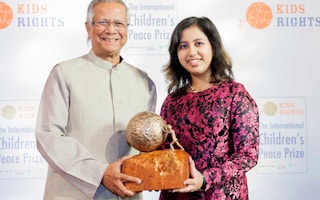Children must be given a direct role in making decisions on how to protect the planet because they will suffer most from the impacts of climate change, said the winner of the 2016 International Children’s Peace Prize.
Kehkashan Basu, 16, from the United Arab Emirates, received the annual child rights award in the Hague on Friday, the first time it has been given to a young environmental activist.
In 2013, the prize was won by Pakistani education campaigner Malala Yousafzai, who went on to become the youngest Nobel Peace laureate.
When Basu - who was born on World Environment Day, June 5 - turned eight, she planted a tree in the garden of her apartment complex, and said she hasn’t looked back since.
“I always felt that it was pre-ordained that I should grow up to take care of Mother Earth, and become an eco-warrior,” she told the Thomson Reuters Foundation in an interview from the Netherlands.
Green Hope, the organisation Basu founded when she was 12, now has more than 1,000 members and is active in 10 countries. It helps young people learn about environmental challenges and how to achieve a sustainable world.
“
Once the children get to know about what’s going on in the world, they start asking what they can do to help save the planet.
Kehkashan Basu, founder, Green Hope
When told the facts about global warming, “most of them are extremely shocked because they have never heard of it before”, said Basu.
“Once the children get to know about what’s going on in the world, they start asking what they can do to help save the planet,” she added.
Green Hope encourages young people to find their own ways of responding to environmental challenges - from composing songs about climate change to recycling waste into fashion and jewellery.
The group has also planted more than 5,000 trees in the United Arab Emirates, India, Brazil, Indonesia, Nepal and Kenya.
“Tree planting is the simplest yet most effective way of mitigating climate change and stopping land degradation,” Basu said.
Nobel Peace Laureate Muhammad Yunus, who presented the prize to Basu, said her work was urgent because more than 3 million children under the age of five die every year from environment-related diseases such as respiratory infections and diarrhoea.
“A healthy environment is essential for the survival, wellbeing and development of children, and therefore it is a precondition for the realisation of the rights of the child,” he said.
Shaping the future
Since attending a United Nations Environment Programme conference for young people in 2011, Basu has taken part in some 45 international summits and U.N. climate talks.
Children now get more attention at these meetings, including a designated day to highlight the role of youth and their aspirations at the annual U.N. climate conference.
But young people are still not permitted to participate directly in negotiations on international accords, such as the Paris Agreement on climate change, Basu noted.
“What I want is that children and youth are involved and ingrained in the negotiations,” she said. “That is (how) you can take us, our voices into account in the best way.”
A report issued on Friday by the KidsRights Foundation - which organises the children’s prize - urged the United Nations to add a protocol to the Convention on the Rights of the Child that explicitly promotes environmental rights for children.
Those who make the rules should ensure “children too have a voice in determining their future, because they are the ones who are going to be living on a dry, barren planet if nothing is done now”, said Basu.
“I think we children would be able to achieve a sustainable world much faster because of our direct approach,” she said.
This story was published with permission from Thomson Reuters Foundation, the charitable arm of Thomson Reuters, that covers humanitarian news, women’s rights, trafficking, property rights and climate change. Visit http://news.trust.org.










